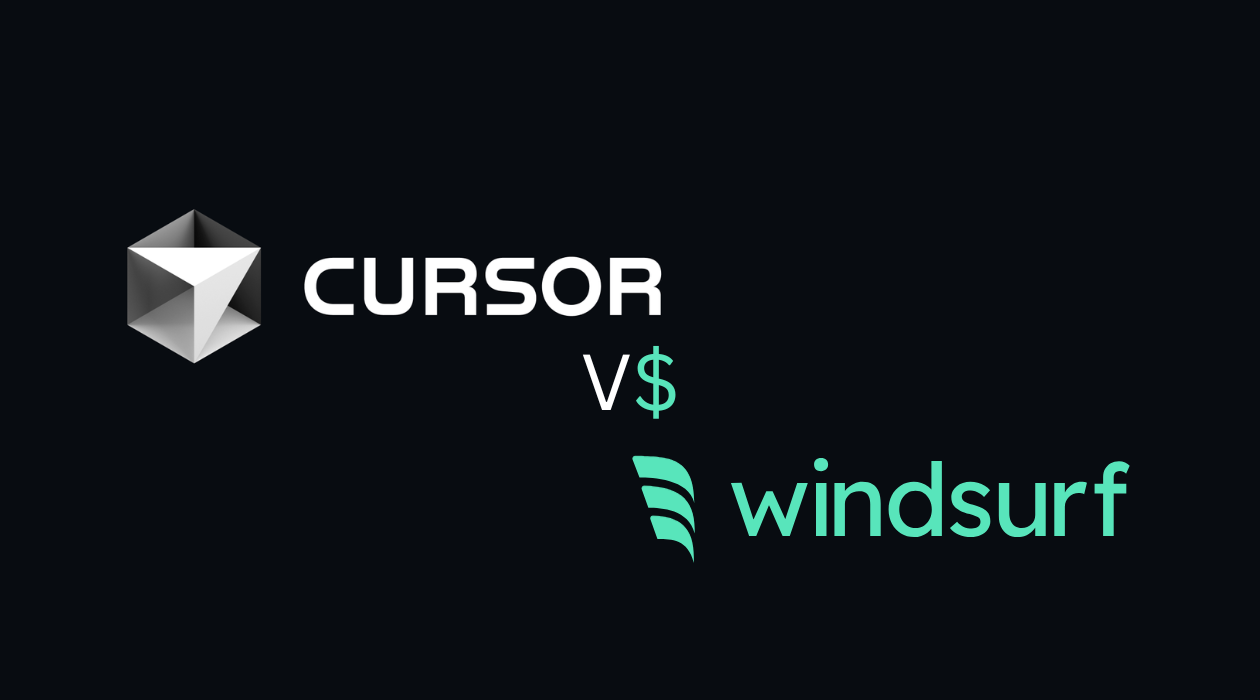The AI code tools market is expected to be worth $12.6B by 2028. There are tons of AI coding tools out there. They try to make coding tasks faster by helping human developers or automating entire workflows. The most famous tool is probably GitHub Copilot. But instead of the Goliath, let's focus on two other players who are loud in my bubble.
I've used Cursor daily for a year now. Everyone at Palindrom uses Cursor. A couple of months ago, Windsurf from Codeium gained traction on social media, and many YouTube videos and X threads compared which one is the better AI code editor. Feature-wise, both deliver very similar capabilities:
- VSCode forks, so you can use your favorite VSCode extensions in their code editor too
- There is an integrated chat panel where you can talk with the AI about the codebase
- They offer autonomous code editing by the AI, where the AI selects the right files and changes them based on your prompt
Instead of performance comparison, let's look behind the product and investigate them from the business perspective.
Importance of The Investors
There were a lot of utopian ideas at the beginning of the internet. Everybody could achieve success if they created good value. Like Friedman thought in his book, titled The World Is Flat, a small dev team from India could compete with much larger companies because of the internet.
Indeed new companies were born in that era. Some of them disappeared, like Netscape, which is basically the Mozilla Organization in its previous life, some of them still exist like Google, Amazon or later Facebook. As Pogi shows these companies succeeded largely because they raised huge amounts of investor money at the perfect time, not just because they had the best technology or were the most innovative.
What will happen in the AI space? The next big thing in AI in the next couple of years will be AI coding. Or at least it seems so. Let's explore the current AI coding companies' investors and try to find out who will win.
Investment Rounds
The different stages of business have their own investment rounds. Each round represents a different maturity level for the startup. The first phase is seed funding, when the startup gets funding for its idea from angel investors.
The first round when venture capitals show up is Series A, when the startup gets money for demonstrating the potential to grow and generate revenue.
At Series B, the startup has proven market fit. They have customers. They raise money to scale up.
Series C is about expanding to new markets, acquiring other businesses, or developing new products.
Behind Cursor
Anysphere, the company behind Cursor, announced their product in January 2023, when everyone was excited about ChatGPT. The product arrived at the perfect time - developers wanted to experiment with AI tools.
The investment history of Cursor tells us about a fast-growing company. They got their seed funding - $8M - from OpenAI's startup fund in 2023, and some notable angel investors joined like GitHub's former CEO Nat Friedman and Dropbox co-founder Arash Ferdowsi.
By August 2024, they raised $60M in Series A led by Andreessen Horowitz (a16z). The fascinating part is who joined this round. Besides Thrive Capital, we can find Jeff Dean, Google's chief scientist at DeepMind, and Noam Brown from OpenAI among the investors. Also, the founders of successful tech companies like Stripe, GitHub, Ramp, and Perplexity showed interest in the company.
Their main investor, Andreessen Horowitz (a16z), is not just another VC firm. Their portfolio shows they know how to spot the next big thing in tech. They invested early in Facebook, Instagram, and GitHub - all of which turned into massive successes. They were also early believers in Airbnb, Coinbase, and Slack.
The caliber of individual investors - especially from the AI field - suggests a strong belief in their technical approach. This shows in their recent moves too, like the team up with Supermaven to improve their code completion capabilities. They're clearly betting that technical excellence, backed by AI expertise, will be the key to winning the developer tools race.
As of summer 2024, they have thousands of users.
Behind Codeium
The company Codeium, behind the Windsurf product line, took a different path from their competitor. They launched their VS Code extension in November 2022, basically at the same time when ChatGPT was released. In the first half year, they positioned themselves as a real enterprise option in the AI coding field, focusing on code privacy opportunities and on-premise deployment.
Their company, developing the new Windsurf product, has raised $243 million after their Series C round, reaching a $1.25 billion post-money valuation. The investment rounds came quickly:
- Series A: April 2022
- Series B: January 2024
- Series C: August 2024
Their investor lineup reads like a history book of tech investing. Kleiner Perkins isn't just one of Silicon Valley's oldest VC firms - they spotted and backed companies that defined entire eras of technology. They invested in Amazon when it was just an online bookstore, Google when search engines weren't a big deal yet, and backed newer success stories like Spotify. They also have a keen eye for transformative software tools - they invested in Figma, which Adobe almost acquired for $20 billion, and Coursera, which revolutionized online education. They even invested in Netscape, which started the browser wars in the '90s.
General Catalyst brings a different kind of experience. They're known for backing transformative companies like Airbnb and Stripe, but recently they've made a massive $8B bet on AI investments. Their portfolio includes other AI companies like Mistral AI, showing they understand where the technology is heading. The third investor, GreenOaks Capital, founded in 2012, rounds out their investor list with expertise in global internet investments and B2B services.
Codeium has 800,000+ active users and 1,000+ enterprise customers, according to Anthropic.
Conclusion
Foundational model providers like Anthropic and OpenAI are quickly becoming the equivalents of cloud giants such as Google, AWS, and Microsoft. Meanwhile, the successful product companies built on top of these AI platforms—akin to how Netflix and Uber leveraged cloud infrastructure—are still in their early stages. The next few years may well be the era in which new, large-scale AI product companies emerge and reshape the market.


Member discussion: